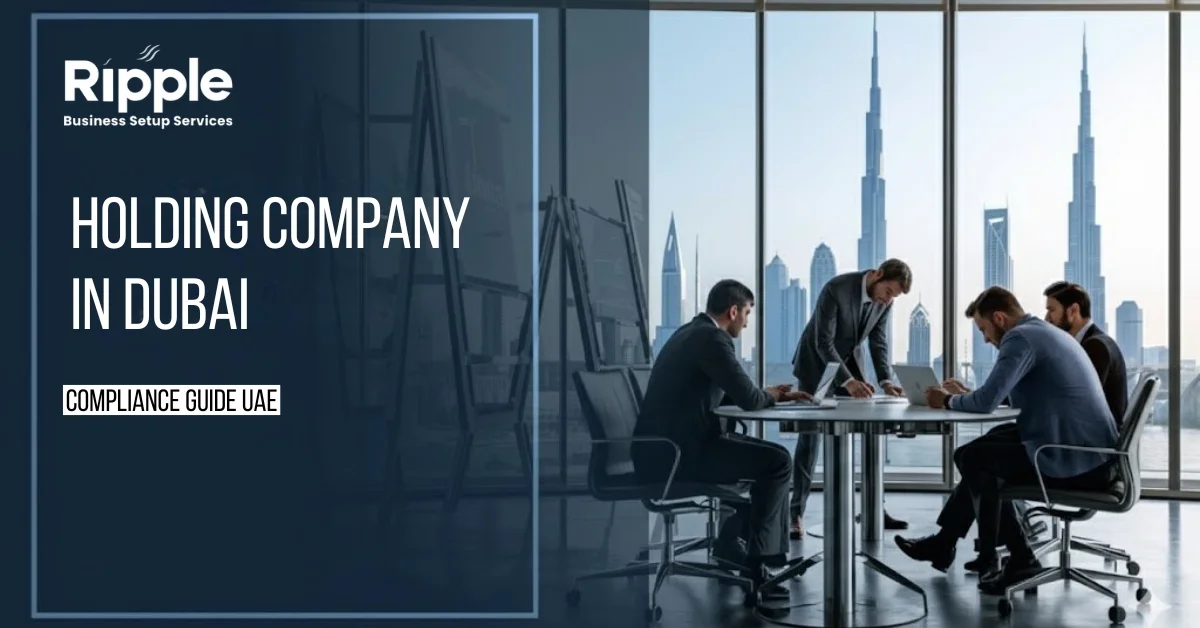A holding company in Dubai is one of the most strategic business structures investors use to manage multiple assets and subsidiaries under one corporate umbrella. This type of entity does not typically engage in day-to-day commercial operations but holds ownership interests in other companies, real estate, or intellectual property.
For global investors, establishing a holding company in Dubai offers both financial protection and administrative convenience. It allows entrepreneurs to manage risks, consolidate profits, and simplify ownership structures.
Dubai’s investor-friendly environment, tax advantages, and robust legal framework make it a preferred destination for holding companies. With clear business regulations, advanced infrastructure, and full foreign ownership opportunities, Dubai has become a trusted global hub for corporate structuring and compliance.
What Is a Holding Company in Dubai?
A holding company in Dubai is a legal entity that primarily exists to own and control other companies or assets. Its core purpose is to oversee management, reduce operational risk, and manage investments efficiently.
Unlike a trading or operating company that performs daily commercial activities, a holding company focuses on asset protection, investment management, and group governance. It can hold shares of subsidiaries, real estate properties, patents, and other financial instruments.
Common industries in the UAE where holding structures are used include:
- Real estate and property management
- Logistics and shipping
- Energy and infrastructure
- Technology and digital businesses
- Family offices and investment funds
By separating ownership from operations, holding companies help investors safeguard their wealth, optimize tax liabilities, and maintain clear business control.
Legal Structure and Jurisdictions for Holding Companies
When setting up a holding company in Dubai, investors can choose between Mainland, Free Zone, or Offshore jurisdictions, each offering distinct benefits.
1. Mainland Holding Company
Mainland structures allow greater flexibility to operate within the UAE market. They are governed by the Department of Economy and Tourism (DET) and are ideal for investors managing subsidiaries within the UAE.
2. Free Zone Holding Company
Dubai offers multiple free zones, such as the Dubai Multi Commodities Centre (DMCC), the Dubai International Financial Centre (DIFC), and the Jebel Ali Free Zone (JAFZA), which offer 100% foreign ownership, zero customs duties, and simplified reporting requirements.
3. Offshore Holding Company
Offshore jurisdictions, like JAFZA Offshore or RAK International Corporate Centre (RAK ICC), are suitable for international asset holding and tax efficiency. These entities can hold shares in UAE or foreign companies without maintaining a physical office in Dubai.
Choosing the right structure depends on your business objectives, investment size, and compliance obligations. Each jurisdiction has its own regulatory framework and reporting requirements.
Regulatory Framework for Holding Companies in Dubai
The UAE Commercial Companies Law (Federal Law No. 32 of 2021) provides the foundation for corporate governance, shareholder rights, and compliance requirements for holding companies.
In Dubai, the Department of Economy and Tourism (DET) oversees the registration and licensing of mainland companies, while individual Free Zone authorities regulate their own entities.
To operate legally, a holding company must:
- Obtain a valid business license (Mainland or Free Zone)
- Register its directors and shareholders
- Maintain a registered office address
- Submit annual renewal applications on time
Dubai’s well-defined legal structure ensures transparency, investor confidence, and regulatory protection, making it one of the most reliable jurisdictions for holding companies worldwide.
Compliance Requirements for Holding Companies
Compliance is an essential part of running a holding company in Dubai. Authorities emphasize accurate record-keeping, transparent governance, and adherence to financial regulations.
Key compliance requirements include:
- Annual Audits: Holding companies must maintain audited financial statements to demonstrate accountability and operational transparency.
- Director and Shareholder Duties: Directors are responsible for ensuring the company follows UAE laws and meets reporting obligations.
- Corporate Governance: Companies must hold board meetings, maintain minutes, and store official records securely.
- Tax Registration: Holding companies are required to register for corporate tax and, if applicable, VAT, depending on their revenue and operations.
- Renewal Filings: Business licenses and visas should be renewed annually to maintain good legal standing.
Non-compliance can result in penalties, license suspension, or reputational damage, so maintaining updated compliance records is critical.
Ultimate Beneficial Owner (UBO) Regulations
To enhance corporate transparency, the UAE has implemented Ultimate Beneficial Owner (UBO) regulations requiring companies to disclose their true ownership structure.
A UBO is the individual who ultimately owns or controls a company, either directly or indirectly. Holding companies in Dubai must identify and report their UBOs to the relevant authority.
Key points include:
- Filing UBO details within 60 days of incorporation
- Updating changes within 15 days
- Maintaining an internal UBO register
Failure to comply can lead to financial penalties or suspension of business operations. Ensuring accurate and timely disclosure helps build investor trust and aligns with global anti-money laundering standards.
Economic Substance Regulations (ESR) for Holding Companies
The Economic Substance Regulations (ESR) apply to UAE entities engaged in specific activities, including holding company business. The ESR framework ensures companies have a substantial presence and real economic activity in the UAE.
For a holding company in Dubai, ESR compliance involves:
- Maintaining adequate physical presence in the UAE
- Having qualified directors and employees
- Submitting annual ESR notification and report
However, pure holding companies that earn only dividends and capital gains have simplified ESR requirements compared to operational entities.
To stay compliant, companies should assess their activities annually and ensure they meet all filing deadlines under the UAE Ministry of Finance guidelines.
Anti-Money Laundering (AML) and Compliance Policies
Dubai upholds strict Anti-Money Laundering (AML) and Counter-Terrorism Financing (CTF) standards. Holding companies, particularly those with international financial transactions, must comply with these frameworks.
AML compliance includes:
- Implementing internal risk assessment policies
- Maintaining detailed transaction records
- Reporting suspicious transactions to the relevant authorities
- Conducting due diligence on subsidiaries and shareholders
Establishing strong AML controls not only ensures compliance but also strengthens the company’s corporate integrity and global reputation. Regular staff training and third-party audits can help maintain adherence to AML regulations.
Taxation and VAT Compliance for Holding Companies
Tax compliance has become a vital aspect of managing a holding company in Dubai since the introduction of the UAE Corporate Tax Law in 2023.
Holding companies may be subject to corporate tax if they earn income within the UAE, though dividends and capital gains from qualifying shareholdings are often exempt. To comply:
- Register for corporate tax with the Federal Tax Authority (FTA)
- File periodic tax returns as required
- Maintain proper accounting records for all subsidiaries
If the holding company’s annual turnover exceeds AED 375,000, it must also register for Value Added Tax (VAT).
Dubai’s extensive double taxation treaties with over 100 countries further protect holding companies from paying taxes twice on the same income, enhancing global operational efficiency.
Importance of Compliance for Long-Term Business Success
Compliance is not just a legal formality; it’s a strategic advantage. A holding company in Dubai that maintains strong compliance enjoys greater credibility, attracts investors, and minimizes risks.
Consistent adherence to UBO, ESR, AML, and tax regulations ensures:
- Business continuity with no regulatory interruptions
- Investor confidence through transparent governance
- Avoidance of penalties and reputational harm
By embedding compliance in daily operations, holding companies can secure long-term stability and enhance their global competitiveness.
How Ripple Business Setup Helps You Stay Compliant
Navigating Dubai’s complex compliance environment can be challenging. That’s where Ripple Business Setup comes in.
Ripple offers complete support for entrepreneurs and corporations looking to establish and maintain a holding company in Dubai. Their services include:
- Company formation and licensing assistance
- UBO, ESR, and AML compliance management
- Annual audit and tax filing coordination
- Ongoing advisory for corporate structuring and governance
With Ripple’s expert team, businesses can operate confidently, knowing all legal and regulatory requirements are met.
Contact Ripple Business Setup for professional guidance:
📞 +971 50 593 8101 | 🌐 www.ripplellc.ae
Conclusion
Establishing a holding company in Dubai offers investors an efficient way to manage multiple assets while benefiting from the UAE’s strong legal framework, favorable tax system, and investor-friendly regulations.
However, maintaining compliance is the key to long-term success. From UBO and ESR filings to AML controls and tax registrations, every aspect of compliance contributes to the company’s credibility and sustainability.
By staying proactive and partnering with experts like Ripple Business Setup, investors can ensure their holding companies remain fully compliant, secure, and positioned for growth in Dubai’s thriving business environment.
Disclaimer: This article is for general informational purposes only and does not constitute legal or financial advice. Always consult a licensed UAE business advisor for specific guidance.






